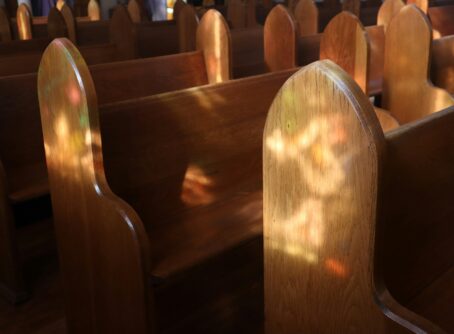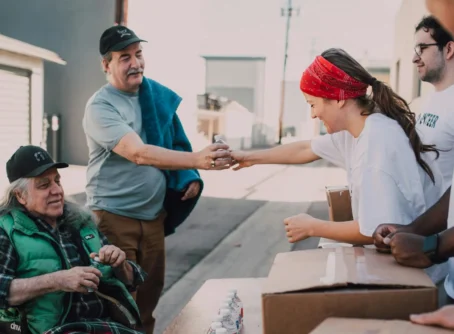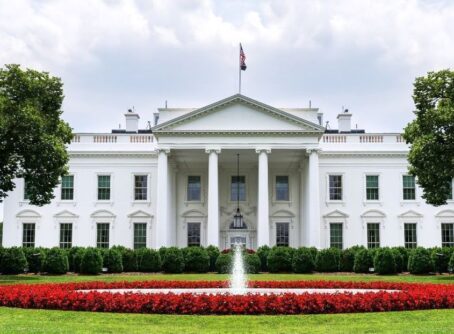
In mid-January 2024, U.S. Senator Marco Rubio (R-FL) and colleagues introduced the Safeguarding Charity Act to advance the independence of America’s tax-exempt organizations. Senator Rubio stated:
“Civic organizations like churches, schools, and charities are crucial to our communities. I remain concerned by recent court decisions that could subject these organizations to burdensome federal regulations simply because they are tax-exempt. My Safeguarding Charity Act would protect these organizations from the government’s politicized battles so they can continue their vital work in our communities.”
According to Greg Baylor, Alliance Defending Freedom (ADF) Senior Counsel and Director of the ADF Center for Religious Schools, the Safeguarding Charity Act seeks to confirm that a nonprofit’s tax-exempt status is not equivalent to government funding, and therefore does not trigger several burdensome federal laws that could jeopardize the tax-exempt status of charities and nonprofits. Charities and nonprofits play a crucial role in providing social, spiritual, and civic services to their communities across the country. As Baylor has stated:
“Yet some courts have wrongly held that the government is actively funding these groups simply by permitting them to keep the contributions donors give them. These court decisions unexpectedly subject nonprofits to a number of expensive legal obligations they never contemplated when they applied for and received their tax-exempt status. Worse, the IRS could punish a nonprofit unable to comply with these unexpected, burdensome requirements by stripping its tax-exempt status—something Congress never intended. We commend Sen. Rubio and Rep. Steube for introducing this crucial legislation to protect nonprofit organizations, enabling them to continue serving their communities without unfair and unforeseen government interference.”
Legal Background of Federal Financial Assistance and Tax-Exempt Status
Throughout American legal history, independent schools have generally been exempt from complying with particular federal nondiscrimination laws, including Title IX of the Education Amendments Act of 1972 (Title IX). This was due to the fact that they mostly did not receive federal government funding and their tax-exempt status was not considered a type of financial assistance. During the pandemic period of 2020 to 2022, many independent schools broke with their history of not receiving federal funding. Many private educational institutions -faith-based and secular – applied for and received Paycheck Protection Program (PPP) Act funding. In receiving PPP funds, independent schools agreed to be subject to federal nondiscrimination laws, including Title IX, during the period the schools were still in debt to the federal government (the loans could be repaid or forgiven after a specified time).
In a significant about-face from prior legal precedent, the U.S. District Court for the District of Maryland ruled on July 21, 2022, that a private school’s status as a tax-exempt organization under Section 501(c)(3) constitutes federal financial assistance, thus requiring compliance with Title IX. In this set of consolidated cases, Buettner-Hartsoe v. Baltimore Lutheran High School Association d/b/a Concordia Preparatory Schools, former students brought claims of unwelcome sexual conduct, among other things, prior to the school’s receipt of a PPP loan, against Concordia Preparatory School in Baltimore, Maryland. Some students claimed the school violated Title IX. Concordia Prep argued that it was not subject to Title IX compliance because it was not a recipient of federal financial assistance. However, the court ruled that the school’s tax-exempt status constituted federal financial assistance for Title IX purposes.
Similarly, on July 25, 2022, the U.S. District Court for the Central District of California made a similar ruling regarding tax-exempt status equating to receiving federal funding. In E.H. v. Valley Christian Academy, a female playing football for a public school visited Valley Christian in 2021. After Valley Christian realized she was female, she was allegedly prohibited from playing future games against Valley Christian. The student sued, alleging Title IX violations. Valley Christian argued it had not received federal financial assistance, but the court held that Valley Christian’s 501(c)(3) status constituted federal financial assistance under Title IX.
According to Venable, a reputable law firm which has an Independent Schools practice, prior to the above decisions, federal financial assistance had not encompassed tax-exempt status of civil society organizations. Some categories that did constitute federal financial assistance as defined by Title IX included, but were not limited to, the following: grants or loans, scholarships or wages for student tuition payments, federal property grants or loans, approval to use federal property or lease or sale of that property, or contracts that support any educational program.
Venable’s Independent Schools practice offers the following guidance:
“These trial court decisions, if upheld on appeal, would significantly impact independent schools’ policies regarding their response to sex-based misconduct, as the vast majority of independent schools are tax-exempt organizations under Section 501(c)(3). Given that these opinions represent a departure from prior interpretations, we can expect that they will be appealed. Additionally, given conflicting opinions, this interpretation is not settled law. Therefore, we recommend that independent schools await further guidance and consult with their legal counsel.”
The Safeguarding Charities Act does seem to be a bill that upholds common ground, and bipartisan values about the role and diversity of civil society organizations in American life. Unfortunately, this bill has only received Republican support in the Senate, and generally has received public support from only conservative-leaning religious and secular nonprofit organizations. (I would happily be proven wrong and hope any readers who know of diverse examples of nonprofits supporting this legislation will come forward.) Recently, Philanthropy Roundtable offered public support for this proposed legislation. Courtney Shadegg, writing on behalf of Philanthropy Roundtable, has written: “America’s rapidly increasing political divide has emboldened politicians and activists on both sides to seek new ways to target their opposition. Nonprofit organizations increasingly find themselves in the crosshairs of our ongoing political and cultural wars. Targeting nonprofit organizations that exist to address community problems and provide assistance for those in need should be off limits on the political battlefield.”
Impact on Diverse Place-Based and Faith-Based Nonprofits
The Safeguarding Charities Act is particularly important to small and emerging nonprofits, spiritual communities, and innovative educational models that have proliferated since the pandemic. Many, though not all, of these organizations are religious or faith-based, raising further questions about the intersection between tax-exempt status, religious freedom, and the burdensome requirements that come with being classified as accepting federal financial aid. Of course, if the Safeguarding Charities Act is not passed and the concerning cases equating tax-exempt status to receiving government funding are not favorably ruled, then perhaps hundreds of thousands of congregations across the country, including those without official 501c3 status, could be impacted.
Other emerging tax-exempt groups that have aligned themselves with recent nonprofit trends could be disproportionately impacted. According to Forbes, which recently surveyed anticipated nonprofit trends for 2024, smaller, placed-based organizations will continue to need to grow their capacity to respond to the distinct needs of their communities: “community-based organizations will continue to play a key role as trusted messengers within civil society.” These place-based nonprofits vary widely across size, community served, religious and secular, and those which receive federal financial assistance and those which (often intentionally) do not. But they all need the flexibility and capacity to serve the distinct needs of their members and representative service populations, which aligns with the goals of Rubio’s proposed legislation. With respect to funding sources, Forbes predicts nonprofits will focus on innovative sources outside of federal grants which come with massive regulatory or legal burden. Rather, nonprofits will grow their focus on “creating a deeper focus on grassroots movement funding.” Along similar lines, Forbes identified nonprofits emphasizing more private philanthropic dollars through a trust based giving lens, which will “continue to grow, allowing nonprofits to be more flexible and innovative in how they leverage money to increase impact.” Such innovation and fluidity remains out of the realm of possibility with most federal financial assistance, which is why some civic membership organizations, religious service organizations, independent educational institutions, and other community groups have opted out of federal funding and the strings attached. Now, however, all of these groups and more face the potential of being included in this category simply because of their exempt status.
Another instance where the Safeguarding Charities Act could be particularly necessary is in the case of diverse educational organizations that have obtained tax-exempt status. This need arises due to recent legal precedents equating tax-exempt status with receiving federal financial assistance, thereby subjecting all tax-exempt organizations to numerous additional legal obligations. According to a Washington Post analysis, home schooling has emerged as America’s fastest-growing form of education, surpassing all other methods by a significant margin. This research, according to the Post: “reveals that a dramatic rise in home schooling at the onset of the pandemic has largely sustained itself through the 2022-23 academic year, defying predictions.” The Post estimates that between 1.9 and 2.7 million children are now home-schooled in the U.S. This is highly relevant to the discussion of small, faith-based and place- based emerging nonprofit organizations because so many emerging home-school communities receiving tax-exempt status could be impacted if the Safeguarding Charities Act is not passed. The Post looked at Hillsborough County, Fla. where home-schoolers numbered over 10,000 students in 2022. As the Post notes, following this community can reveal the general trend of organizations and communities emerging to support the surge in home schooling. According to the Post: “Just as remarkable is the infrastructure that has grown up to support home-schoolers.” The Post notes that the nonprofit organizations that have emerged to support home-schoolers include sports leagues, theater clubs, academic and social cooperatives, and home-school groups that offer experiences like graduation and school dances. Likewise, the Post reports that New York is among the fastest growing home-school ranks. In the city, home-school alliances support science fairs and ice skating trips.
Around the country, micro-schools, coops, extracurricular clubs, nature study groups, enrichment and elective clubs, farm and homesteading organizations, cottage schools based on particular philosophical and religious approaches, have emerged to support the myriad and diverse ways home-schools form collectives and communities. As widely reported, as home schooling numbers have surged in the past five years, so have the nonprofit (tax-exempt) organizations that have emerged to support these home or hybrid schooling families.
In conclusion, the Safeguarding Charity Act, introduced by U.S. Senator Marco Rubio and colleagues, seeks to protect the independence of America’s tax-exempt organizations, including churches, schools, and charities. This legislation is crucial in light of recent court decisions that have equated tax-exempt status to receiving federal financial assistance, thereby subjecting nonprofits to burdensome federal regulations. The Act aims to ensure that tax-exempt status is not considered government funding, preserving the autonomy of nonprofits to continue their vital work in communities. However, the bill has faced limited bipartisan support, highlighting the need for broader recognition of the critical role nonprofits play in society. Upholding the values of religious freedom and diversity in civil society, the Safeguarding Charity Act is essential in supporting the continued growth and impact of small, faith-based, and place-based nonprofits. While many examples could illustrate the impact on various aspects of the nonprofit sector, this article has also briefly explored the effects on a specific area: the proliferation of tax-exempt organizations that have arisen in response to the challenges presented by the pandemic and the rise in home schooling.
Chelsea Langston Bombino is a believer in sacred communities, a wife, and a mother. She serves as a program officer with the Fetzer Institute and a fellow with the Center for Public Justice.




